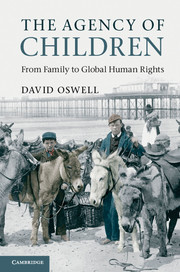Book contents
- Frontmatter
- Contents
- Figures
- Acknowledgements
- Part I Introduction
- Part II Social theories of children and childhood
- Part III
- 6 Family and household
- 7 School and education
- 8 Crime and criminality
- 9 Health and medicine
- 10 Play and consumer culture
- 11 Political economies of labour
- 12 Rights and political participation
- Part IV Conclusions
- Bibliography
- Index
6 - Family and household
Published online by Cambridge University Press: 05 April 2013
- Frontmatter
- Contents
- Figures
- Acknowledgements
- Part I Introduction
- Part II Social theories of children and childhood
- Part III
- 6 Family and household
- 7 School and education
- 8 Crime and criminality
- 9 Health and medicine
- 10 Play and consumer culture
- 11 Political economies of labour
- 12 Rights and political participation
- Part IV Conclusions
- Bibliography
- Index
Summary
The family and household from the late nineteenth century, if not earlier, have been seen as incubators of children’s agency. The family and household were seen as coextensive and as locations for children’s passive socialisation, but they are now recognised as often being disarticulated and as major sites of democratisation. Family and household are now seen to be generators of emotional economy and labour, saturated by media and communications, and often as spaces of talk, fun, love and laughter, but also of anxiety, fear, abuse and violence. But what do we mean by ‘family’ and ‘household’? Sonia Livingstone, in her research on young people and new media, rightly points to the distinctions between, yet often overlapping histories of, the categories of ‘family’, ‘household’ and ‘home’ (Livingstone, 2002: 166). ‘Household’ more often refers to the dwelling of people in a particular place. It refers to the living of people together and the doing of things together (i.e. ‘social groupings which typically share a range of domestic activities in common’ [Allan and Crow, 2001: 5]). It often gets discussed in terms of people’s ‘co-residence’ (Gittins, 1993; Morgan, 1985 and 1996). In all these definitions there is a tendency to prioritise social relations predicated on conditions of ‘co-presence’ (i.e. the ‘being there together’ of a social group), but it is not simply the co-presence of individuals anywhere; it is the co-presence of individuals within a house or a flat; within a particular kind of built place. Ownership or rental of that built environment may be an important element in understanding co-residence; but it would equally disqualify any kinship group that had a nomadic existence. If the dwelling constitutes the concretisation and infrastructuring of living in a place, then ‘household’ designates a fixed dwelling, to the exclusion of other forms of non-fixed itinerant dwelling. There are certainly problems with a definition of household, but it serves the purpose of foregrounding a notion of the ‘family’ as one that is not necessarily articulated with living in the same house or sharing the same activities. Households do not necessarily contain individuals related as kin. We may talk about student households or about friends living together as a household or about single-person households.
- Type
- Chapter
- Information
- The Agency of ChildrenFrom Family to Global Human Rights, pp. 89 - 112Publisher: Cambridge University PressPrint publication year: 2012



